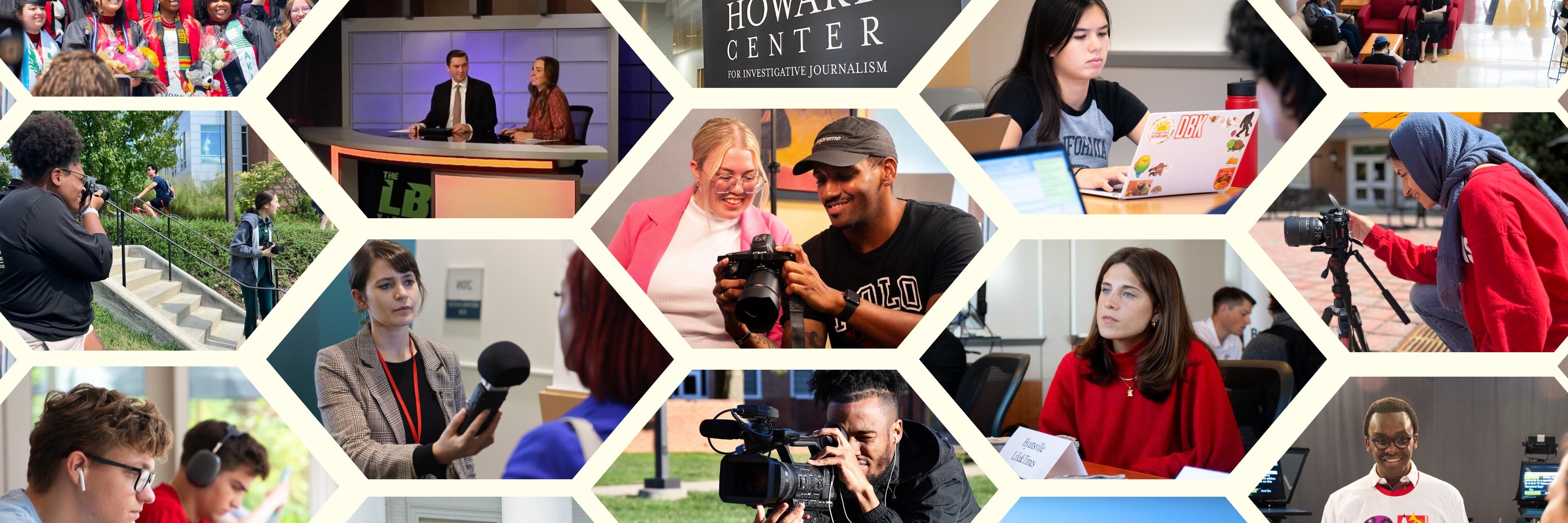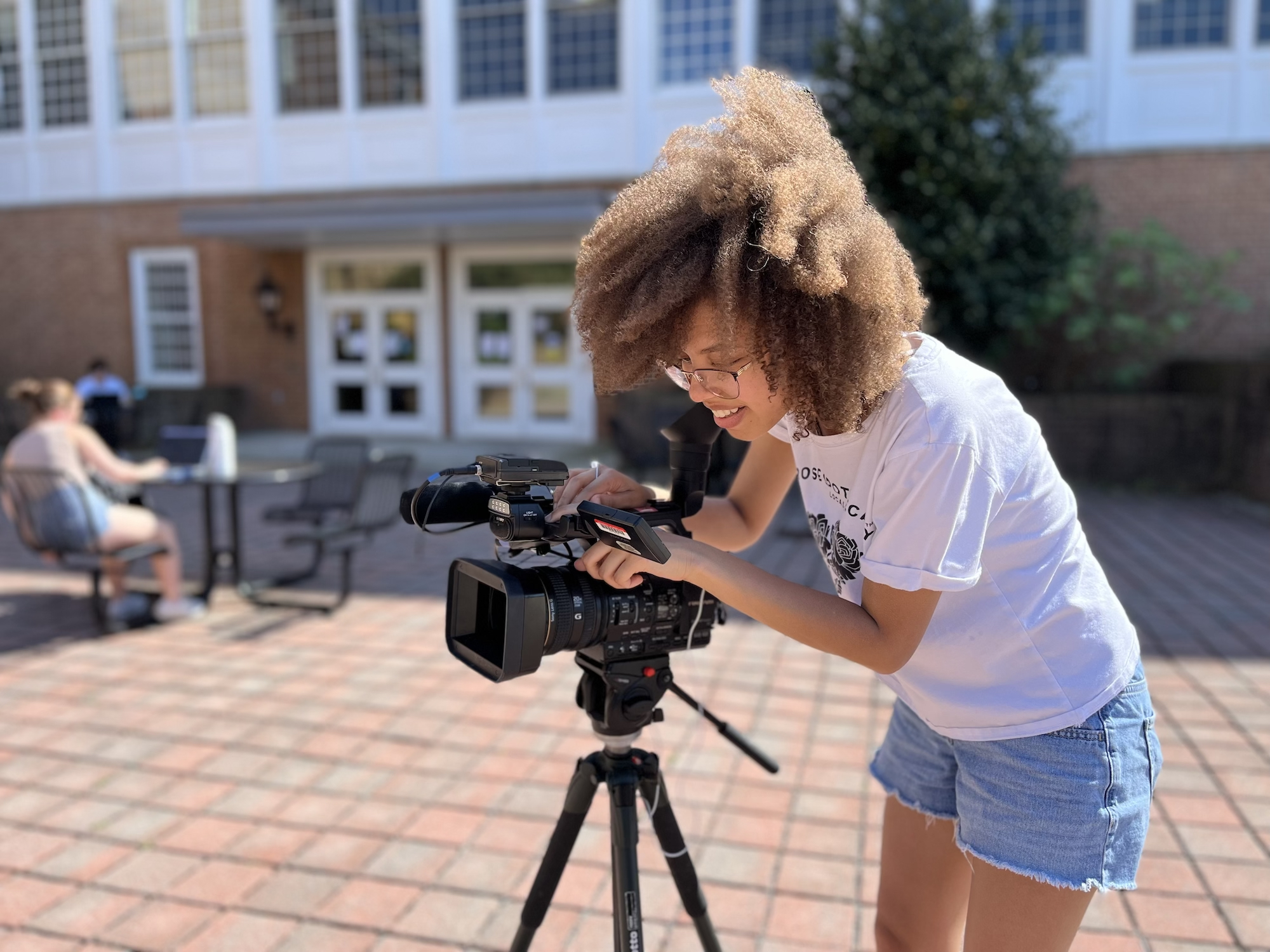
The University of Maryland’s Philip Merrill College of Journalism offers a student experience that sets it apart from journalism schools nationwide and helps prepare students for what awaits in the professional world.
And that’s reflected in the combination of course offerings that make the college unique.
At Merrill, students have the opportunity to learn hands-on from an exceptional, nationally recognized faculty that has combined to conduct a great deal of research and to win Pulitzer Prizes, Peabody Awards, Emmys and more. Under their instruction, Merrill graduates go on to be hired by the most prestigious news outlets in the country and win top awards in the field.
The college’s exciting, innovative curriculum is designed to provide students with the hands-on experience, tools and concepts they will need to develop into top-notch professional journalists and dynamic storytellers. Data journalism is woven into every fiber of the college, alongside AI and other emerging technologies that students will need in the evolving media world.
Every semester, Merrill College’s offerings change and expand for the times. Here are eight new courses being introduced in Fall 2024!
- JOUR389X/JOUR689X: Investigative Reporting with Artificial Intelligence and Open Source Intelligence (OSINT) Data
This project-based course taught by Sean Mussenden, data editor at the Howard Center for Investigative Journalism, will help you learn to use cutting-edge investigative tools like artificial intelligence, machine learning, generative language models or computational analysis. You will also learn how leading news organizations, OSNIT researchers, human rights groups and researchers use these advanced technological methods to tell stories.
Time: Monday, 1:30-4:15 p.m.
- JOUR389Z/JOUR689Z: Introduction to Music Journalism
In this course taught by music journalist Marcus Moore, who writes for The New York Times, you will learn what it takes to be a well-rounded music journalist — the kind who can review records, write bios and profiles, and curate cultural events. The course has a strong focus on song and album criticism, deep listening and interview skills. Information covered includes feature writing, artist conversations, reading comprehension and deadline reporting.
Time: Tuesday, 1-3:45 p.m.
- JOUR389P/JOUR689P: Beyond the Briefing Room: Covering the White House and National Politics in a Divided America
In this course taught by New York Times White House Correspondent Michael Shear, you will follow the 2024 election from the perspective of a correspondent on the trail. You will learn how to write on deadline, develop sources, craft questions for live briefings, build expertise quickly, use new technologies and frame enterprise stories. Information covered includes political bias, objectivity, the debate over the public’s right to know, national security, classification and the manipulation of White House officials.
Time: Tuesday & Thursday, 9-10:50 a.m.
 JOUR368T/JOUR668T: Documentary Video Production and Cinematography
JOUR368T/JOUR668T: Documentary Video Production and Cinematography
This course taught by Broadcast Lecturer Alanna Delfino-Kopania will introduce you to shooting, editing and video production for film and web. Information covered includes visual storytelling, story research, lighting, interviewing, editing, and managing video and film projects.
Time: Monday & Wednesday, 11 a.m. - 12:50 p.m.
- JOUR328P: Enterprise Reporting and Solutions Journalism
In this course taught by Local News Network Director Jerry Zremski, you will report and craft in-depth enterprise stories that will be published as part of a project produced for Merrill College’s LNN. You will learn the basics of solutions journalism and produce solutions stories as your final project.
Time: Wednesday, 2-4:45 p.m.
- JOUR389R/JOUR689R: Computational Text Analysis
This course taught by Associate Professor Rob Wells introduces you to key skills and concepts in the digital humanities and how they can be applied to computational analysis. In this course, you will learn how to gather textual data, process it and conduct various analyses, machine learning and topic modeling using the R programming language. You will then process your findings into various data visualization programs.
Time: Tuesday, 9-11:45 a.m.
- JOUR389D/JOUR689D: Social Video Journalism
In this course taught by Jackie Padilla, senior video producer at POLITICO, you will create strategic short-form video journalism for social media that’s engaging, informative and creative. Information covered spans everything from the pre-production to the field production to the post-production process.
Time: Monday & Thursday, 5:20-7:10 p.m.
- JOUR668Z: Examining Representation in Documentary, Film and Digital Media
Created for both filmmakers and scholars, this course taught by Associate Professor Krishnan Vasudevan will help you examine the representation of people, places and cultures in documentaries, television and social media. Each week you will learn a visual theory that will guide your weekly in-class discussions and assignments. The course culminates with a final project that you will develop using your understanding of those theories.
Time: Wednesday, 1-3:45 p.m.
